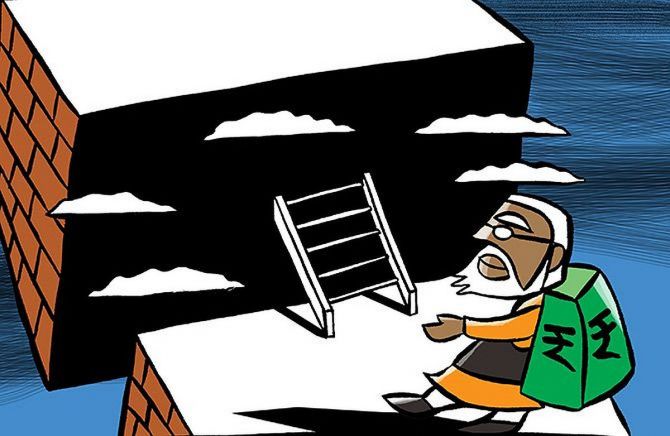The government is confident of meeting the fiscal deficit target of 5.9 per cent of gross domestic product (GDP) and the nominal GDP target of 10.5 per cent despite pressure in the initial months of FY24, Economic Affairs secretary Ajay Seth told Business Standard.

Normally the initial months of any financial year see proportionally a higher fiscal deficit because the expenditure is evenly paced while revenue picks up in the later months, he said.
“This year the proportional fiscal deficit so far is much closer to the target than in most other years.
"GST collection growing at about 11 per cent is a good sign.
"It shows that underlying economic activities are doing well.
"In the course of the full year, whatever the sum total of tax revenue (target) is in the Budget will be achieved,” he said.
The government’s fiscal deficit widened to 33.9 per cent of the full-year target during April-July compared to 20.5 per cent during the same period in the preceding year, according to the data released by the Controller General of Accounts.
Amid concern about inflation and Finance Minister Nirmala Sitharaman calling for supply-side measures instead of depending only on monetary policy to control inflation, Seth said both these steps took time to be effective.
“The government is watching many sectors for its supply-side measures,” he added.
The retail inflation rate jumped to a 15-month high at 7.44 per cent in July owing to prices of vegetables, pulses, cereals, and spices shooting up.
Seth said among the possible reasons for nominal GDP in the first quarter showing 8 per cent growth (lower than the 10.5 per cent) was that the wholesale price index (WPI) numbers in the first quarter of the previous financial year were very high.
The WPI started moderating significantly from the third quarter last financial year.
Seth said, going forward, the WPI numbers would be more than what “we have been seeing now once the base effect wears off”.
“By the end of the year, I see around 10.5 per cent of the nominal growth rate happening, as was assumed in Budget formulation,” he added.
India’s GDP growth of 7.8 per cent in the first quarter this financial year had been driven by the services sector.
At the same time investment has grown faster than consumption.
“Overall investment numbers are strong. The government has stepped up its capex by means of frontloading in the initial months, with 31 per cent of the Budget being utilised in the first four months.
"The moderate growth of consumption expenditure is not cause for concern.
"We do not want only consumption-oriented growth,” Seth added.
The finance ministry has been frontloading capital expenditure and tax devolution to enable states to speed up capital spending, finance development and welfare-related expenditure, and have resources for priority projects and schemes.
Of the Rs 10.21 trillion budgeted to be transferred in FY24, the Centre has released over Rs 3.09 trillion in tax devolution to states till July.
On how additional expenditure pressure would play up, Seth said: “There will always be pluses and minuses.
"As far as capital expenditure is concerned, it is clear in the finance ministry that we have to facilitate a full flow early on.”
Meanwhile, tighter monetary policies have had an effect on capital flows.
In this context, Seth said that any decline in the foreign direct investment (FDI) numbers should not be seen on a quarter-to-quarter basis but more in the medium term.
“India is not an exception in receiving less FDI. Globally FDI flows have come down.”
The DEA is also negotiating the bilateral investment treaty with several countries including the UK.
“Our best effort is to complete negotiations on investment at the same time as for the trade agreement. Both sides want to find common ground so as to arrive at mutually acceptable terms,” Seth said.











